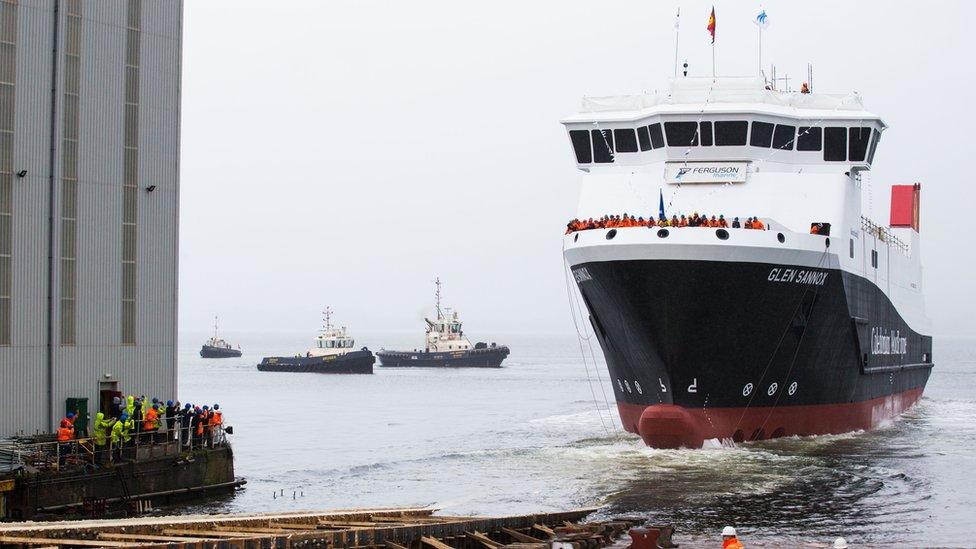UK's first liquefied natural gas ferry launched on Clyde
- Published

The UK's first LNG passenger ferry is launched on the Clyde
The UK's first liquefied natural gas (LNG) passenger ferry has been launched on the Clyde by First Minister Nicola Sturgeon.
The MV Glen Sannox, which can accommodate up to 1,000 passengers, can also operate on marine gas oil (MGO).
It is the first of two ferries being built as part of a £97m Caledonian Maritime Assets Limited contract.
The vessel will help to reduce emissions to meet ambitious Scottish government targets.
The ferry, which has been earmarked for the Ardrossan to Brodick route and will begin operating in winter 2018/19, was unveiled at Ferguson Marine Engineering Limited's Port Glasgow shipyard.
Climate change goals
It is 335ft (102m) long and designed to carry 127 cars or 16 HGVs, or a combination of both.
Ms Sturgeon praised the contribution the company makes to the industrial sector and the Inverclyde economy.
She said: "These state-of-the-art ferries are more sustainable, therefore contributing to Scotland's world-leading climate change goals.
"They are also capable of carrying more vehicles and benefiting the communities that rely on them."
Jim McColl, chief executive of Clyde Blowers which owns FMEL, said: "The successful launch of the MV Glen Sannox marks an important milestone in Ferguson Marine's journey to becoming a world-class shipyard.
"As this is the first ferry in the UK capable of being run on liquefied natural gas and marine gas oil, not only has this been an extremely exciting and ambitious project for both FMEL and CMAL, but it has been an extremely complex one as well."
Future benefits
Mr McColl said there were a number of "highly challenging engineering issues" arising from the dual fuel ferry project.
He added: "The experience and knowledge gained during this project will be of enormous benefit to the competitiveness of Scottish shipbuilding in the future as technology continues to develop to meet tightening clean energy legislation."
Kevin Hobbs, chief executive of CMAL, said: "The use of LNG in maritime transport is a sign of our ongoing commitment to exploring new fuel technologies for ferries, as well as a wider commitment to innovation in Scotland and consideration for the environmental impact of transport."
The second LNG vessel, which has yet to be named, is currently under construction and has been earmarked to serve Tarbert, Lochmaddy and Uig.
The Scottish government is expected to publish its third Climate Change Plan in the start of 2018 as part of efforts to cut emissions by 66% by 2032.